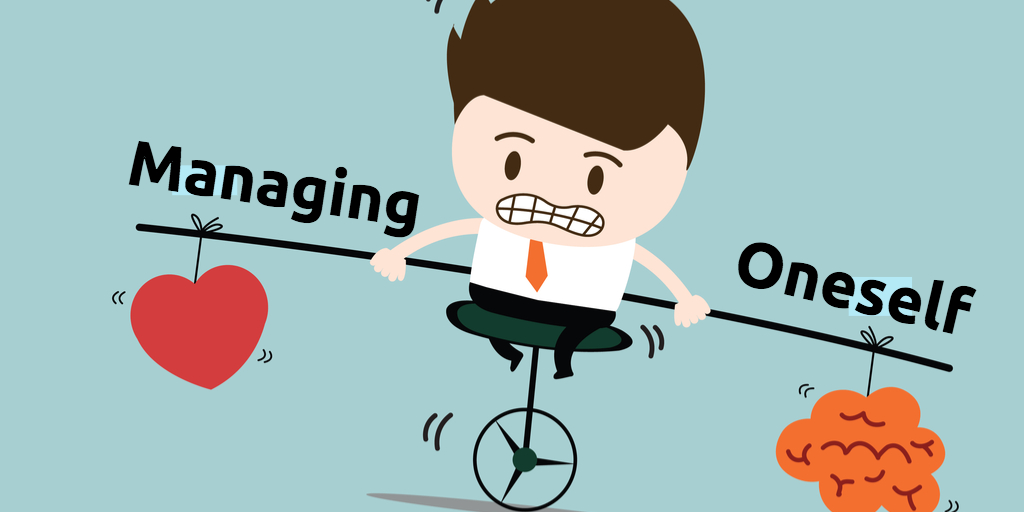
We’re an affiliate!
We hope you love the books we recommend! Just so you know, we may collect a share of sales or other compensation from the links on this page. Thank you very much if you use our links, we really appreciate it.
Long story short, “Managing Oneself” is about taking our careers into our own hands by teaching us to align how to best leverage our strengths, fit in the right environments, and contribute to the best cause that matches our needs.
To anyone who has ever done something worth doing, the one thing they had in common was that they were able to manage their internal selves. The greatest achievers in history from Leonardo Di Vinci to Walt Disney to Muhammad Ali understood the principles of managing oneself.
From the Peter Drucker classic, the idea of Managing Oneself is essential to seizing opportunities when they come your way in your career, relationships and overall life.
For those who don’t know
Peter Drucker is the father of modern management. He wrote over 35 books on shaping the way organizations function and manage its people. Drucker is also the recipient of the Presidential Medal of Freedom in 2002.
Navigating today’s world of distractions makes it difficult to understand ourselves and how we can make contributions to the world. The principles of “managing ourselves” Drucker refers to managing our:
- Strengths
- Performance
- Values
- Sense of belonging
- Contributions
#2: “About Peter Drucker * Drucker Institute.” Drucker Institute, www.drucker.institute/perspective/about-peter-drucker/.
With these aspects in our life, we are able to find what calling or muse we were meant to deliver to the world.
What am I good at?
The first key to managing oneself is to focus on your strengths, not your weaknesses. Ironically enough, people actually tend to focus on improving their weakness while ignoring their strengths.
The optimal approach to developing your strengths is through the concept of “feedback analysis”. This occurs when you write down an expected result or outcome while making an important decision or action. After a period of 9 to 12 months, the key is to note the difference between the results written down and the results that actually happened.
After getting the hang of implementing feedback analysis, you are able to identify the gaps of which areas of skills & knowledge need work, and which areas you tend to be strong at.
By understanding this, we are able to acknowledge our natural aptitudes and put more energy towards perfecting it. While doing this, it is equally as important to waste as little time as possible shoring up those weaknesses.
Drucker mentions that:
It takes a lot more energy improving from incompetence to mediocrity than it takes to improve from first-rate performance to excellence.
How do I perform?
After natural aptitude, the next step is to develop a working process that works for you. Typically, a working process is a specific way of accomplishing tasks to ensure you put yourself in the best position to succeed.
Speaking vs. Writing vs. Reading vs. Doing
By yourself vs. small groups vs. Medium groups vs. Large groups
As an adviser vs. Primary decision maker
Everyone has their own special processes in how they go about accomplishing tasks, so it is up to you to find a process that works best for YOU.
What are my values?
Your values are reflected of how you look at yourself in the mirror each and every day. They determine the ethics you set out for yourself and how you cope with your conscious.
To be effective in an organization, a person’s values must be compatible with the organization’s values
These values tend to be influenced by each individuals’ unique upbringing as it formulates what each person stands for. An example of values would be the emphasis of short-term results versus long-term growth.
Sometimes, an individual’s strengths or an organization they are apart, may clash with their values. If there is a mismatch between your values and the organization you are apart of, there tends to be a lower production in results.
Where do I belong?
Despite years of formal education and training, most of us tend to not know where we should make our contributions on this planet.
Building off of the three recent points of finding our strengths, performance and values, these can provide clear indicators of the ideal environment we would fit in. This would enable us to seek environments that match our natural aptitudes and characteristics as opposed to forcing a fit in any given organization.
Drucker explains that:
Successful careers are not planned, they develop when people are prepared for opportunities because they know their strengths, their method of work and their values.
What should I contribute?
All of this leads towards making a significant contribution in our own unique way. Finding a sense of meaning or purpose is the highest level of fulfillment we can strive for.
Once we understand which environment we can best apply our strengths, processes and values, channeling all of this towards a unified purpose is how we define where we can make contributions and deliver.
What can I do from here?
From here, we can start to do a self-reflection for our:
- Natural aptitudes and strengths
- Processes and personal systems
- Ethics and morale code
- Working environments
- Sense of purpose and contributions
After acknowledging this, that is where we can see what is currently working and which gaps we would need to fill in.
It is never too late to start managing yourself.
If you would like to give Peter Drucker’s Managing Oneself a read while supporting the blog feel free to click below:
Sources for this post:
#2: “About Peter Drucker * Drucker Institute.” Drucker Institute, www.drucker.institute/perspective/about-peter-drucker/.






